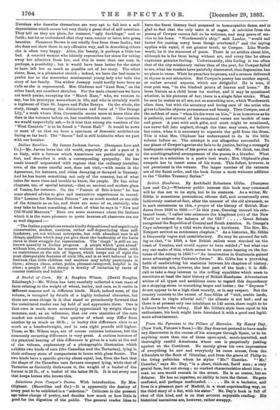British Honduras. By Archibald Robertson Gibbs. (Sampson Low and Co.)—Whatever
public interest this book may command will be due not to its style, but to its contents. As a writer, Mr Gibbs is sometimes pretentious, oftener dull, and occasionally even ludicrously matter-of-fact, after the manner of the old almanack, as in such statements as this, d propos of the history of British Hon- duras from 1826 to 1828 :—" In thisi year, Canning uttered his cele. brated boast, called into existence the kingdoms (sic) of the New World to redress the balance of the Old !' Great Britain recognised the Republics of Central and South America. St. George's Caye submerged by a tidal wave during a hurricane. The Rev. Mr. Newport arrived as settlement chaplain." As a historian, Mr. Gibbs is frequently vague and unsatisfactory. He may be excused for tell- ing us that, " in 1638, a few British sailors were wrecked on the coast of Yucatan, and would appear to have settled ;" but what can any one make of this, which seems to have some bearing on the for- tunes of the colony in 1850 ?—" An insurrection in Guatemala gained some advantage over Carrera's forces." Mr. Gibbs has a provoking habit of sandwiching his statistics between his chapters of history. The statistics are, however, the best part of the book ; it is diffi- cult to take a deep interest in the trifling squabbles which seem to constitute at least the later history of British Honduras. Adventurous whites of all types and ambitions seem to regard this dependency as a stepping-stone to something larger and better ; the " Baymen " do not appear to be a high class morally, or in any respect. But the country consists to the extent of four-fifths of "rich, arable lands, laid down in virgin alluvial soil ;" the climate is not bad ; and as there is at present only one inhabitant to 145 acres, there ought to be a future before the colony. Had Mr. Gibbs's style been equal to his enthusiasm, his book might have furnished it with a good and legiti- mate advertisement.


































 Previous page
Previous page